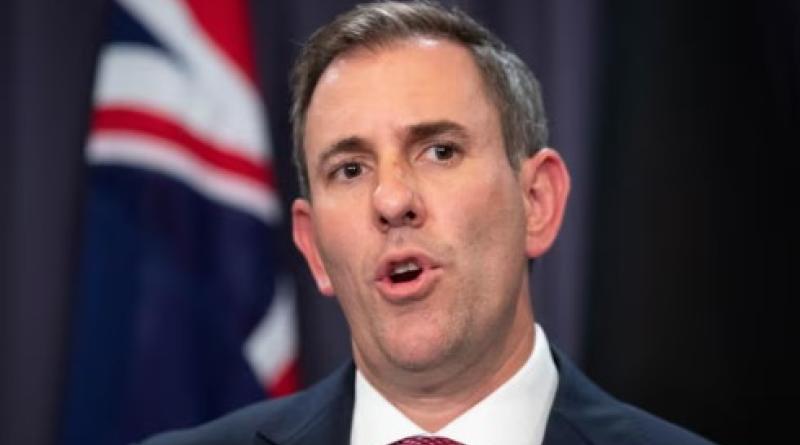Jim Chalmers open to clean energy investment reforms pushed by super funds

Jim Chalmers has signalled the Albanese government is open to considering sweeping reforms being championed by industry superannuation funds to unlock billions in private capital to fund Australia’s clean energy transition.
After meeting on Tuesday with banks, venture capital firms, super funds and investor groups in Canberra, the treasurer told journalists he had committed to consider specific measures proposed by AustralianSuper, cbus, HostPlus, CareSuper, Hesta, UniSuper and the behemoth Australian fund IFM Investors.
The government also announced on Tuesday that it had joined a global partnership at the Cop28 climate summit committed to stopping national governments spending billions of dollars on fossil fuels overseas, saying it had heeded calls from Pacific leaders.
The climate change minister, Chris Bowen, and the assistant climate minister, Jenny McAllister, fly to the summit in the United Arab Emirates later this week.
The industry funds, which manage about $1.2tn, are seeking specific commitments including concessional finance or “availability payments” to bankroll the new transmission infrastructure required to link renewable power generation to the grid and production tax credits to help develop a sustainable Australian aviation fuel industry.
The chair of IFM, Cath Bowtell, gave a presentation to Tuesday’s investor round table convened by Chalmers and Bowen. IFM is owned by 17 Australian industry super funds and had approximately $217bn under management last financial year.
Chalmers said IFM and super funds outlining potential reforms to supercharge the transition was “a really good development because there are vast industrial opportunities here in the clean energy transformation”.
“There’s a lot of good work and a lot of deep thinking that’s gone into those proposals,” he said. “We’ve committed to consider them.”
He said the government was “unlikely” to delivering the entire wishlist but “it might be possible for us to do some of them after we carefully consider it”.
The government also agreed to consult on options to improve the superannuation performance test to better balance achieve steady growth in retirement incomes with unlocking capital for economic priorities, including housing and the net zero transformation.
In addition to specific measures to spur investment, the investor community has pressed the government to outline detailed sectoral plans for decarbonisation in six areas of the economy: electricity and energy, industry, resources, the built environment, agriculture and land, and transport.
Tuesday’s investor round table agreed on a set of principles to guide the sectoral plans, which are meant to set a roadmap for meeting national emissions reduction targets for 2035 and 2050.
Rebecca Mikula-Wright, the chief executive of the Investor Group on Climate Change, said Tuesday’s agreements were a “crucial move towards the clarity and confidence that investors need to deploy capital into Australia’s economic future”.
“The global transition to net zero has already started and Australia is now taking the steps to make our path clear instead of chaotic,” she said. “To keep moving together we need to keep working together.”
A range of groups are lobbying the government to increase incentives to keep private clean energy capital in Australia and avoid losing it overseas.
The Biden administration’s Inflation Reduction Act, which includes $369bn (A$560bn) support for clean energy has escalated global competition for climate-focused investment, and the UK, Europe, Canada and Japan have also introduced incentives. IFM confirmed last month it would sink £10bn (A$19bn) into infrastructure and energy transition projects in Britain by 2027.
Clean energy partnership
In Dubai, the Albanese government signed up to an agreement called the statement on international public support for the clean energy transition partnership, joining 40 other countries. The partnership, which was establishing at Cop26 in Glasgow two years ago, aims to create new rules to end international financing of fossil fuels across the OECD.
In a statement, the foreign affairs minister, Penny Wong, said joining the partnership was a step in Australia aligning its position on international financing with Pacific countries.
Bowen said it showed Australia was “finally being taken seriously as a constructive international trading partner and investor determined to take meaningful action on climate change”.
Activists praised the commitment and said more should follow. James Sherley, climate justice campaigner at the Jubilee Australia Research Centre, said the government was taking “the long overdue step” of acknowledging foreign aid and federal export finance should not be spent on fossil fuel expansion.
“We welcome this announcement as potentially a first step on the road to phasing out fossil fuels,” he said. “To deliver on its promise will require strong implementation, which we will be watching closely.”
A report by Oil Change International and Friends of the Earth found Australia’s export credit agency, Export Finance Australia, largely favoured fossil fuels under the Morrison government between 2019 and 2021, with only 19% of support going to clean energy developments.
Photograph: Mike Bowers/The Guardian





